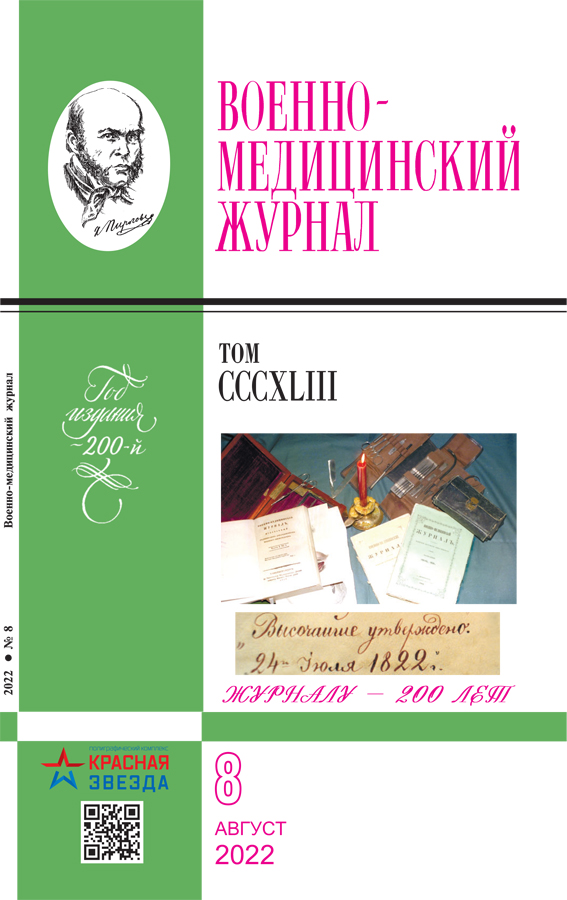Modern possibilities of combined treatment of advanced gastric cancer
- 作者: Pashaev A.A.1, Dolgikh R.N.2, Narimanov M.N.3, Pashaev A.A.4
-
隶属关系:
- Branch No. 3 National Medical Research Center of High Medical Technologies – the A.A.Vishnevsky Central Military Clinical Hospital of the Ministry of Defense of the Russian Federation
- National Medical Research Center of High Medical Technologies – the A.A.Vishnevsky Central Military Clinical Hospital of the Ministry of Defense of the Russian Federation
- Podolsk Regional Clinical Hospital of the Ministry of Health of the Moscow Region
- Branch of the S.M.Kirov Military Medical Academy of the Ministry of Defense of the Russian Federation
- 期: 卷 343, 编号 8 (2022)
- 页面: 35-39
- 栏目: Treatment and prophylactic issues
- URL: https://journals.eco-vector.com/0026-9050/article/view/629689
- DOI: https://doi.org/10.52424/00269050_2022_343_8_35
- ID: 629689
如何引用文章
详细
An analysis of the methods used to treat disseminated gastric cancer in a military hospital is presented. The study included an analysis of 362 medical records of patients with this pathology. The patients were divided into 3 major groups. Group I – the large volume resection cytoreductive surgeries were performed (gastrectomy or distal subtotal resection of the stomach), group II – palliative symptomatic surgeries were performed without removal of the main tumor (applying nutritional stoma and bypass fistulas), group III – only diagnostic interventions were performed as exploratory laparotomy or diagnostic laparoscopy or the operation was not completed. Group I, depending on the volume of surgical intervention, was further divided into 2 subgroups: subgroup I1 – radical operations were performed; subgroup I2 – performed palliative resection interventions. The effectiveness of cytoreductive operations with removal of the primary source in patients with advanced gastric cancer was confirmed, which was expressed in an increase in survival rates at various follow-up periods (from 1 to 5 years).
作者简介
Af. Pashaev
Branch No. 3 National Medical Research Center of High Medical Technologies – the A.A.Vishnevsky Central Military Clinical Hospital of the Ministry of Defense of the Russian Federation
编辑信件的主要联系方式.
Email: afkan.pashaev@mail.ru
подполковник медицинской службы
俄罗斯联邦, Krasnogorsk, Moscow regionR. Dolgikh
National Medical Research Center of High Medical Technologies – the A.A.Vishnevsky Central Military Clinical Hospital of the Ministry of Defense of the Russian Federation
Email: afkan.pashaev@mail.ru
кандидат медицинских наук, полковник медицинской службы
俄罗斯联邦, Krasnogorsk, Moscow regionM. Narimanov
Podolsk Regional Clinical Hospital of the Ministry of Health of the Moscow Region
Email: afkan.pashaev@mail.ru
профессор
俄罗斯联邦, Podolsk, Moscow RegionAl. Pashaev
Branch of the S.M.Kirov Military Medical Academy of the Ministry of Defense of the Russian Federation
Email: afkan.pashaev@mail.ru
лейтенант медицинской службы
俄罗斯联邦, Moscow参考
- Бесова Н.С., Болотина Л.В., Калинин А.Е. и др. Практические рекомендации по лекарственному лечению рака желудка / Злокачественные опухоли: Практ. реком // RUSSCO. – 2019. – Т. 9. – С. 308–323. doi: 10.18027/2224-5057-2019-9-3s2-308-323
- Грищенко С.В., Седаков И.Е., Грищенко И.И. и др. Эпидемиология, нозогеография, факторы риска и меры профилактики злокачественных новообразований желудочно-кишечного тракта в современных условиях // Вестн. гиг. и эпидем. – 2020. – Т. 24, № 1. – С. 113–121.
- Давыдов М.И., Аксель Е.М. Статистика злокачественных новообразований в России и странах СНГ в 2012 году. – М.: Издат. группа РОНЦ, 2014. – 226 с.
- Пашаев А.А., Лесик П.С., Сутурин С.П., Потапский В.В., Базин Д.В. Малоинвазивный метод операций при раке желудка экономически и клинически более оправдан, чем традиционный: Матер. Всерос. науч.-практ. конф., посвящ. 55-лет. 25 ЦВКГ РВСН. – Одинцово, 2017. – С. 203–205.
- Пашаев А.А., Сутурин С.П., Кириченко С.С., и др. Технические неудачи при малоинвазивной хирургии рака желудка: Тез. докл. 17-го съезда Рос. об-ва эндоскопич. хирургов. – 2014. – № 1. – С. 307–308.
- Пашаев А.А., Харисов А.М., Сутурин С.П., Кириченко С.С., Базин Д.В., Лесик П.С. Опыт лечения больных раком желудка // Воен.-мед. журн. – 2020. – Т. 341, № 2. – С. 80–81.
- Ajani J.A., Lee J., Sano T. et al. Gastric adenocarcinoma // Nat. Rev. Dis. Primers. – 2017. – Vol. 3. – P. 17036.
- Chiu C.F., Yang H.R., Yang M.D. et al. Palliative Gastrectomy Prolongs Survival of Metastatic Gastric Cancer Patients with Normal Preoperative CEA or CA19-9 Values: A Retrospective Cohort Study // Gastroenterol. Res. Pract. – 2016. – Vol. – P. 27.
- Choi Y.J., Kim N. Gastric cancer and family history // Korean J. Intern. Med. – 2016. – Vol. 31, N 6. – P. 10421053.
- Ford H.E.R., Marshall A., Bridgewater J.A. et al. Docetaxel versus active symptom control for refractory oesophagogastric adenocarcinoma (COUGAR-02): An open-label, phase 3 randomised controlled trial // Lancet Oncol. – 2014. – Vol. 15. – P. 78–86.
- Hsu J.T., Liao J.A., Chuang H.C. et al. Palliative gastrectomy is beneficial in selected cases of metastatic gastric cancer // BMC Palliat. Care. – 2017. – Vol. 16. – P. 19.
- Japanese gastric cancer treatment guidelines 2010 (ver. 3) // Gastric Cancer. – 2011. – Vol. 14, N 2. – Р. 113–123. doi: 10.1007/s10120-011-0042-4
- Li Q., Zou J., Jia M. et al. Palliative Gastrectomy and Survival in Patients With Metastatic Gastric Cancer: A Propensity Score-Matched Analysis of a Large Population-Based Study // Clin. Transl. Gastroenterol. – 2019. – Vol. 10, N 5. – P. 1–8.
- Muro K., Van Cutsem E., Narita Y. et al. Pan-Asian adapted ESMO Clinical Practice Guidelines for the management of patients with metastatic gastric cancer: A JSMO-ESMO initiative endorsed by CSCO, KSMO, MOS, SSO and TOS // Ann. Oncol. – 2019. – Vol. 30. – P. 19–33.
- Qiu J.L., Deng M.G., Li W. et al. Hepatic resection for synchronous hepatic metastasis from gastric cancer // Eur. J. Surg. Oncol. – 2013. – Vol. 39, N 7. – P. 694–700.
- Wagner A.D., Syn N.L., Moehler M. et al. Chemotherapy for advanced gastric cancer // Cochrane Database Syst. Rev. – 2017. – Vol. 8, N 8. – CD004064.
- Yazici O., Ozdemir N., Duran A.O. et al. The effect of the gastrectomy on survival in patients with metastatic gastric cancer: a study of ASMO // Future Oncol. – 2016. – Vol. 12 – P. 343–354.
补充文件






